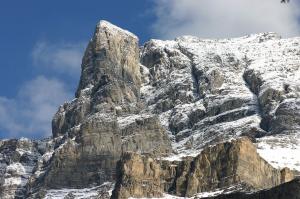I lift my eyes up to the hills,
from where does my help come?
My help comes from The Unseen One,
Maker of the heavens and earth.–Psalms 121:1-2, trans. Kol Haneshamah Shabbat Veḥagim p. 214-15
At B’nai Ḥavurah, the Denver Jewish Reconstructionist Congregation, located in the shadow of the Rocky Mountains, we consider this psalm a local favorite. Psalms 121, described as a Song for the Ascents, traditionally looks to the heights, where godly powers were believed to reside, such as Mt. Sinai, or the Acropolis, to find divine help, in the person of God or The Unseen One. My proposal is a variation of Psalms 121 that adjusts our focus to this world, away from the supernatural, to acknowledge our responsibility for the well-being of ourselves and the environment. Whatever deeds and actions that may need to be taken for repair and preservation of our world, we are responsible for. To look for others to do the work for us, or to postpone acting until divine help comes, may turn out to be the height of recklessness for our own, as well as our children’s future. First we acknowledge what is here and real, then we commit to do what we can to solve problems and make things better.
This variation is designed to allow the words to be sung, with some adjustments, in community with others who are singing the traditional version in Hebrew and English. It is one of a number of personal adaptations from Kol Haneshamah Shabbat Veḥagim, bringing environmental awareness and commitment to Jewish prayer practice by varying traditional liturgy. These adaptations are not to be taken as an expression of the Reconstructionist Movement or B’nai Ḥavurah. Rather, they grow out of my desire to participate in community services with enthusiasm, singing words that resonate with what I want to be saying, expressing the meaning I want to affirm, rather than quoting traditional phrases that usually do not resonate with me, without being too disruptive to my neighbors, especially my wife.
| Hebrew | Transliteration (Romanized Hebrew) | English |
|---|---|---|
אֶשָׂא עֵנַי אֶל מָקוֹם־הַזֶה מֵאַיִן יָבֹא עֶזְרִי אֶשָׂא עֵנַי אֶל הָעוֹלָם מֵאַיִן יָבֹא עֶזְרִי עֶזְרִי בְּמַעַשִׂים שֶׁלִי לְתַּקֵן שָׁמַיִם וָאָרֶץ. עֶזְרִי בְּמַעַשִׂים טוֹבִים לְשַׁמֵּר שָׁמַיִם וָאָרֶץ |
Esa eynay el makom-hazeh me’ayin yavo ezri Esa eynay el ha’olam me’ayin yavo ezri. Ezri bema’asim sheli Letakein shamayim va’aretz. Ezri bema’asim tovim Leshameyr shamayim va’aretz. |
I lift my eyes up to this place, from where does my help come? I lift my eyes up to the world, from where does my help come? My help comes in my deeds to repair heaven and earth. My help comes in (our) good deeds to preserve heaven and earth. |

“אֶשָׂא עֵנַי | An adaptation of Esa Eynai (Psalms 121:1-2), by Ed Towbin-Issur haLevi” is shared through the Open Siddur Project with a Creative Commons Public Domain Dedication 1.0 Universal license.










Pity about God being left out. But I suppose He will forgive…